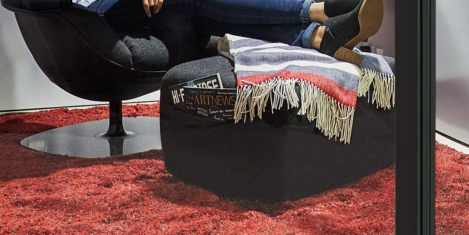To provide the best experiences, we use technologies like cookies to store and/or access device information. Consenting to these technologies will allow us to process data such as browsing behaviour or unique IDs on this site. Not consenting or withdrawing consent, may adversely affect certain features and functions.
The technical storage or access is strictly necessary for the legitimate purpose of enabling the use of a specific service explicitly requested by the subscriber or user, or for the sole purpose of carrying out the transmission of a communication over an electronic communications network.
The technical storage or access is necessary for the legitimate purpose of storing preferences that are not requested by the subscriber or user.
The technical storage or access that is used exclusively for statistical purposes.
The technical storage or access that is used exclusively for anonymous statistical purposes. Without a subpoena, voluntary compliance on the part of your Internet Service Provider, or additional records from a third party, information stored or retrieved for this purpose alone cannot usually be used to identify you.
The technical storage or access is required to create user profiles to send advertising, or to track the user on a website or across several websites for similar marketing purposes.








 Local authorities, which are on the front line of implementation when it comes to smart, place-based digital initiatives could be helped to deliver positive, sustainable citizen outcomes for their locality with the formation of a Digital Board – a new report claims. Launched at techUK’s
Local authorities, which are on the front line of implementation when it comes to smart, place-based digital initiatives could be helped to deliver positive, sustainable citizen outcomes for their locality with the formation of a Digital Board – a new report claims. Launched at techUK’s 








 The latest generation of workplace recruits, the so-called Gen Z graduates, are more likely to stay in their first role if flexible working and mentoring is on offer, new research claims. According to graduate jobs board Milkround, while over half (55 percent) of new graduates’ plan to stay in their first role for less than two years, 76 percent can be encouraged to stay longer with training/mentorship and 63 percent with flexible hours. They are also ambitious and have high expectations, with 65 percent believing they will work in their dream industry. This impacts what is expected of employers and could hold the key to encouraging this new generation to stay in roles longer. This change in expectations begins before they start their new role – 68 percent of graduates are calling for more detailed job descriptions and 57 percent would like to have an open line of communication with their line manager from the moment they accept a job.
The latest generation of workplace recruits, the so-called Gen Z graduates, are more likely to stay in their first role if flexible working and mentoring is on offer, new research claims. According to graduate jobs board Milkround, while over half (55 percent) of new graduates’ plan to stay in their first role for less than two years, 76 percent can be encouraged to stay longer with training/mentorship and 63 percent with flexible hours. They are also ambitious and have high expectations, with 65 percent believing they will work in their dream industry. This impacts what is expected of employers and could hold the key to encouraging this new generation to stay in roles longer. This change in expectations begins before they start their new role – 68 percent of graduates are calling for more detailed job descriptions and 57 percent would like to have an open line of communication with their line manager from the moment they accept a job.
 The new corporate governance code that comes into play early next year includes directives on how companies engage with their staff, but it is a voluntary code which will allow businesses to opt out if they wish. Now a new report suggests there is currently is a high level of mistrust towards senior UK managers, with just 16 percent trusting this group, according to the study. This is despite the fact that according to the research, carried out by Virtual College the majority (95 percent) of senior managers in UK businesses believe that their employees trust them. Employees rated their trust in different roles in the following order; co-workers – 57 percent, managers – 45 percent, team members – 42 percent and senior management – 16 percent. Trust in senior management was found to be considerably lower than trust in other positions such as middle management. The sectors that trusted senior management the least included; utilities (3 percent), legal (8 percent) and government services (8.7 percent).
The new corporate governance code that comes into play early next year includes directives on how companies engage with their staff, but it is a voluntary code which will allow businesses to opt out if they wish. Now a new report suggests there is currently is a high level of mistrust towards senior UK managers, with just 16 percent trusting this group, according to the study. This is despite the fact that according to the research, carried out by Virtual College the majority (95 percent) of senior managers in UK businesses believe that their employees trust them. Employees rated their trust in different roles in the following order; co-workers – 57 percent, managers – 45 percent, team members – 42 percent and senior management – 16 percent. Trust in senior management was found to be considerably lower than trust in other positions such as middle management. The sectors that trusted senior management the least included; utilities (3 percent), legal (8 percent) and government services (8.7 percent).











September 28, 2018
The horrors and harmonies of workplace hierarchy
by Monica Parker • Comment, Technology, Workplace design
(more…)